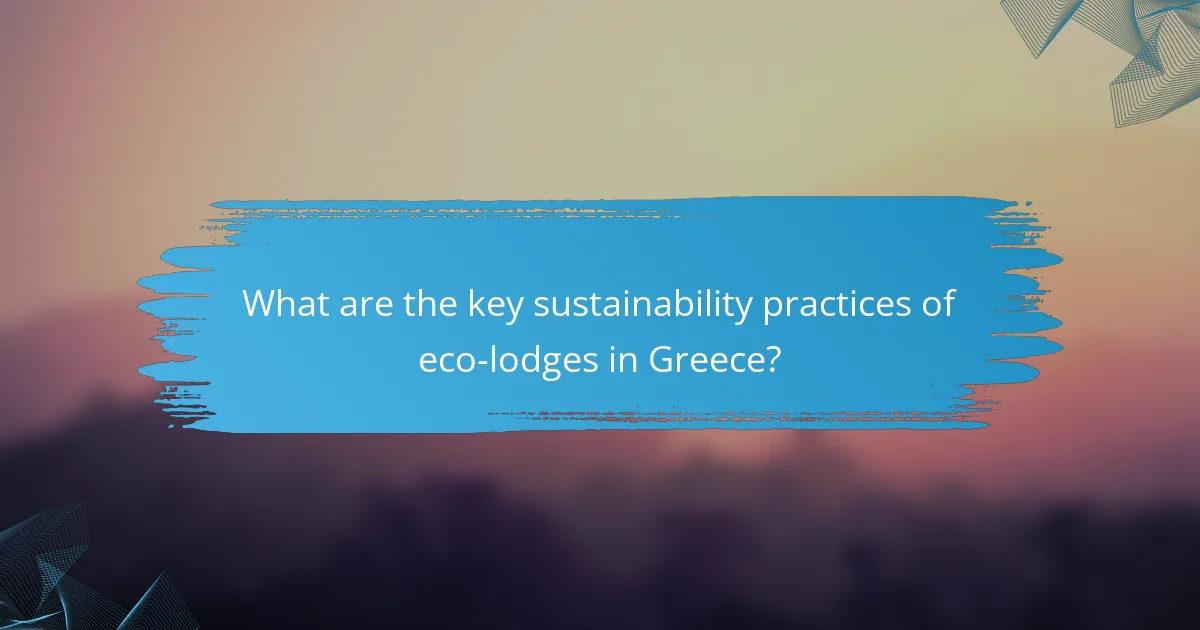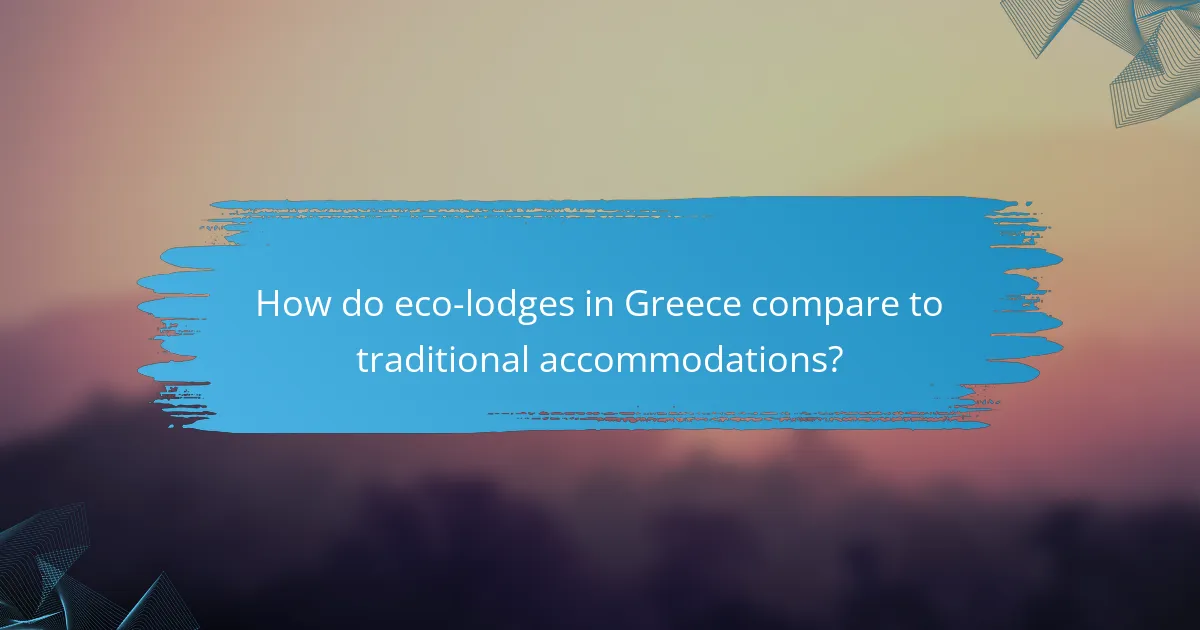Eco-lodges in Greece provide a unique travel experience focused on sustainability and environmental responsibility. They implement renewable energy practices, water conservation techniques, and support local communities. Guests enjoy organic meals, eco-friendly amenities, and immersive cultural experiences. Popular locations include Crete, Peloponnese, and the Ionian Islands, each showcasing Greece’s commitment to eco-tourism.

What are the key sustainability practices of eco-lodges in Greece?
Eco-lodges in Greece implement several key sustainability practices. They prioritize renewable energy sources, such as solar panels, to reduce carbon footprints. Many eco-lodges utilize water conservation techniques, including rainwater harvesting and greywater recycling. Organic gardening is common, providing fresh produce while minimizing chemical use. Additionally, they often engage in local community initiatives, supporting regional artisans and promoting cultural heritage. These practices enhance both environmental responsibility and guest experiences.
How do eco-lodges minimize their environmental impact?
Eco-lodges minimize their environmental impact through sustainable practices like using renewable energy, conserving water, and sourcing local materials. They often implement waste reduction strategies, such as composting and recycling. Additionally, eco-lodges promote biodiversity by preserving natural habitats and supporting local wildlife. These practices contribute to a lower carbon footprint and enhance the overall ecological integrity of their locations.
Which renewable energy sources are commonly used in these accommodations?
Eco-lodges in Greece commonly utilize solar energy, wind energy, and geothermal energy. These renewable sources help reduce carbon footprints and enhance sustainability. Solar panels are frequently installed for electricity and heating, while wind turbines may provide additional energy. Geothermal systems can efficiently manage heating and cooling, making these accommodations environmentally friendly.
What waste management strategies are implemented by eco-lodges?
Eco-lodges in Greece implement various waste management strategies to promote sustainability. These include composting organic waste, recycling materials, and reducing single-use plastics. Many eco-lodges also engage in community clean-up initiatives and educate guests on responsible waste disposal. As a result, they contribute to local environmental conservation efforts.
How do eco-lodges engage with local communities?
Eco-lodges engage with local communities by fostering collaboration and supporting local economies. They often employ local staff, source food and materials from nearby producers, and promote cultural experiences. This engagement enhances community well-being and preserves local traditions. Additionally, eco-lodges may invest in community projects, such as education and environmental conservation, which further strengthens their ties to the area.
What certifications or eco-labels do these lodges typically hold?
Eco-lodges in Greece typically hold certifications and eco-labels such as Green Key, EarthCheck, and EU Ecolabel. These certifications signify commitment to sustainable practices, energy efficiency, and environmental responsibility. Many lodges also participate in local sustainability initiatives, enhancing their eco-friendly credentials.

What amenities can guests expect at eco-lodges in Greece?
Guests at eco-lodges in Greece can expect sustainable amenities that enhance their experience. Common features include organic meals, solar energy, and eco-friendly furnishings. Many lodges offer guided nature tours, wellness programs, and local cultural experiences, ensuring a holistic stay. These amenities reflect a commitment to environmental conservation while providing comfort and relaxation.
How do eco-lodges incorporate local materials into their designs?
Eco-lodges in Greece often use local materials like stone, wood, and clay in their designs to enhance sustainability. This approach not only reduces transportation emissions but also reflects the region’s architectural heritage. By utilizing materials sourced from nearby areas, these lodges create a harmonious connection with the surrounding environment. For instance, many eco-lodges incorporate traditional building techniques that align with local climate conditions, ensuring energy efficiency. Additionally, the use of local artisans promotes community engagement and preserves cultural craftsmanship.
What types of organic food and beverage options are available?
Eco-lodges in Greece offer a variety of organic food and beverage options that emphasize local and sustainable sourcing. These options typically include fresh fruits and vegetables, whole grains, organic dairy products, and locally produced wines and spirits. Many eco-lodges prioritize seasonal ingredients, ensuring that meals reflect the regional harvest. Additionally, some establishments may feature organic coffee and herbal teas sourced from nearby farms. This commitment to organic offerings not only supports local agriculture but also enhances the overall guest experience by promoting health and sustainability.
Which wellness and recreational facilities are offered?
Eco-lodges in Greece offer a variety of wellness and recreational facilities. These include yoga studios, meditation spaces, hiking trails, and organic gardens. Many eco-lodges feature spa services, such as massage therapy and holistic treatments. Additionally, some provide cooking classes focusing on local cuisine, enhancing the overall wellness experience.
How do eco-lodges ensure guest comfort while maintaining sustainability?
Eco-lodges ensure guest comfort through sustainable practices that prioritize both environmental impact and guest experience. They often incorporate natural materials, energy-efficient systems, and local resources to enhance comfort while minimizing ecological footprints.
Amenities such as organic bedding, locally sourced meals, and eco-friendly toiletries contribute to a luxurious yet sustainable stay. Many eco-lodges also offer outdoor activities that connect guests with nature, ensuring a holistic experience.
Locations are strategically chosen to blend with the landscape, providing scenic views and tranquility. By focusing on these aspects, eco-lodges successfully balance comfort and sustainability, creating memorable experiences for guests who value both relaxation and environmental consciousness.

What are the most popular locations for eco-lodges in Greece?
The most popular locations for eco-lodges in Greece include Crete, Peloponnese, and the Ionian Islands. These areas offer stunning natural landscapes and commitment to sustainability.
Crete features eco-lodges that utilize local materials and renewable energy. Peloponnese provides lodges that emphasize organic farming and traditional architecture. The Ionian Islands are known for their biodiversity and eco-friendly practices, attracting nature enthusiasts.
These locations highlight Greece’s dedication to preserving its environment while providing unique accommodations.
Which regions are known for their eco-lodge offerings?
Greece is renowned for its eco-lodges, particularly in regions like Crete, Peloponnese, and the Ionian Islands. These areas offer diverse landscapes and sustainable tourism practices. Eco-lodges in these regions prioritize environmental conservation while providing unique amenities and experiences.
How do geographical features influence eco-lodge experiences?
Geographical features significantly enhance eco-lodge experiences in Greece by shaping the natural environment and available activities. The rugged mountains, pristine beaches, and lush forests create diverse settings for relaxation and adventure.
Eco-lodges often capitalize on their surroundings by offering activities like hiking, birdwatching, and water sports. For instance, lodges near the Aegean Sea provide opportunities for snorkeling and sailing, while those in mountainous regions focus on trekking and nature tours.
The unique attributes of each location, such as proximity to historical sites or natural parks, further enrich the guest experience. Guests enjoy not only the amenities but also the immersive connection to Greece’s diverse landscapes.
Sustainability practices are often influenced by local geography, promoting conservation efforts that protect the environment. Eco-lodges utilize local materials and renewable energy sources, ensuring minimal ecological impact while enhancing the natural beauty of their locations.
What cultural attractions are nearby eco-lodges in Greece?
Nearby eco-lodges in Greece offer access to various cultural attractions, enhancing the sustainable travel experience. Visitors can explore ancient ruins, local art galleries, and traditional villages. Notable sites include the Acropolis in Athens, the archaeological site of Delphi, and the charming town of Nafplio. These attractions reflect Greece’s rich history and vibrant culture, providing guests with immersive experiences while promoting eco-friendly tourism.

How do eco-lodges in Greece compare to traditional accommodations?
Eco-lodges in Greece prioritize sustainability, offering eco-friendly practices that traditional accommodations often lack. Eco-lodges utilize renewable energy sources, promote local culture, and minimize waste. Traditional accommodations may provide more amenities but often do not focus on environmental impact. Eco-lodges typically feature natural materials and organic food options, enhancing the experience while supporting local ecosystems. This unique attribute of eco-lodges creates a distinct travel experience that appeals to environmentally conscious travelers.
What are the main differences in guest experiences?
Guest experiences at eco-lodges in Greece differ significantly based on sustainability practices, amenities, and locations. Eco-lodges often emphasize local culture, offering authentic experiences that connect guests to the environment.
In terms of sustainability practices, some lodges focus on renewable energy sources, while others prioritize organic food sourcing or water conservation methods. Amenities vary widely, with some offering luxurious spa services and others providing basic accommodations with a strong emphasis on nature immersion.
Locations also play a critical role; lodges near national parks or coastal areas provide distinct experiences compared to those in rural settings. These factors collectively shape the guest experience, influencing satisfaction and engagement with the local ecosystem.
How do pricing structures vary between eco-lodges and conventional hotels?
Pricing structures for eco-lodges in Greece typically differ from conventional hotels by emphasizing sustainability and local experiences. Eco-lodges often have higher initial costs due to investments in sustainable practices, yet they may offer unique amenities like organic meals and nature-based activities. Conventional hotels generally follow standard pricing models, focusing on room rates and luxury services.
| Pricing Structure | Eco-Lodges | Conventional Hotels |
|————————|————————————|———————————–|
| Initial Costs | Higher due to sustainability focus | Standard pricing models |
| Amenities | Organic meals, local experiences | Luxury services, standard amenities|
| Target Audience | Eco-conscious travelers | General tourists |
| Booking Flexibility | Often offers packages | Typically room-only options |
| Seasonal Pricing | Variable based on eco-initiatives | Fixed seasonal rates |
What unique benefits do eco-lodges offer to travelers?
Eco-lodges offer travelers unique benefits such as immersive nature experiences, support for local communities, and eco-friendly accommodations. These lodges often utilize renewable energy sources and sustainable materials, minimizing environmental impact. Travelers enjoy organic meals made from locally sourced ingredients, enhancing their connection to the region. Additionally, eco-lodges frequently provide educational programs about local ecosystems, fostering greater environmental awareness among guests.

What challenges do eco-lodges face in Greece?
Eco-lodges in Greece face challenges such as high operational costs, seasonal tourism fluctuations, and strict environmental regulations. These factors impact their sustainability practices and profitability. Additionally, attracting eco-conscious travelers can be difficult due to competition and limited marketing resources.
How do eco-lodges address seasonal fluctuations in tourism?
Eco-lodges in Greece manage seasonal tourism fluctuations through diverse strategies. They offer flexible pricing, promote off-season experiences, and enhance local partnerships. By focusing on sustainable practices, eco-lodges attract eco-conscious travelers year-round, ensuring consistent occupancy. Additionally, they may host events or workshops during low seasons, further diversifying their offerings.
What are the common misconceptions about eco-lodges?
Many misconceptions exist about eco-lodges, primarily regarding their sustainability and amenities. One common myth is that eco-lodges lack modern comforts, but many offer luxurious accommodations while prioritizing eco-friendly practices. Another misconception is that eco-lodges are only for hardcore environmentalists; in reality, they cater to a wide range of travelers interested in sustainable tourism. Some believe eco-lodges are more expensive than traditional hotels, yet many are competitively priced, especially when considering their unique experiences and local support. Lastly, people often think eco-lodges are isolated; however, many are conveniently located near popular attractions, making them accessible for various types of travelers.
How do regulatory factors impact eco-lodge operations?
Regulatory factors significantly influence eco-lodge operations in Greece by establishing guidelines for sustainability practices. Compliance with environmental regulations ensures eco-lodges minimize their ecological footprint. For example, adherence to waste management laws promotes responsible disposal and recycling. Additionally, zoning laws affect location selection, ensuring eco-lodges are situated in areas that protect natural habitats. Regulatory incentives, such as tax breaks for sustainable practices, further encourage eco-lodges to adopt green technologies. Ultimately, these factors shape operational strategies, impacting guest experiences and environmental stewardship.

What trends are shaping the future of eco-lodges in Greece?
Eco-lodges in Greece are increasingly shaped by trends emphasizing sustainability, local culture, and eco-friendly practices. These lodges are adopting renewable energy sources, using sustainable materials, and integrating local produce into their dining experiences.
The rise of eco-tourism is influencing travelers to seek accommodations that minimize environmental impact. Many eco-lodges are located in pristine natural settings, providing guests with immersive experiences in nature while promoting conservation efforts.
Innovative amenities such as organic gardens, nature trails, and wellness programs are becoming standard, enhancing guest experiences while supporting local ecosystems. Furthermore, collaborations with local artisans and communities are fostering economic sustainability and cultural exchange.
As a result, eco-lodges are becoming pivotal in Greece’s tourism landscape, attracting environmentally conscious travelers and promoting sustainable practices across the industry.
How is technology being integrated into eco-lodge experiences?
Technology enhances eco-lodge experiences in Greece through smart energy management, digital booking systems, and eco-friendly amenities. Smart systems optimize energy use, reducing waste and promoting sustainability. Digital platforms streamline reservations and provide guests with information on local eco-initiatives. Additionally, eco-lodges often feature renewable energy sources, such as solar panels, further integrating technology with environmental stewardship.
What innovations are emerging in sustainable hospitality?
Innovations in sustainable hospitality include eco-friendly practices, renewable energy use, and local sourcing of materials. Eco-lodges in Greece exemplify these trends by implementing water conservation systems, solar energy, and organic gardens. Many locations prioritize biodiversity and community engagement, enhancing the guest experience while protecting the environment. These practices not only attract eco-conscious travelers but also contribute to the preservation of Greece’s natural beauty.
How are traveler preferences influencing eco-lodge development?
Traveler preferences are significantly shaping eco-lodge development in Greece. Increasing demand for sustainable tourism is driving eco-lodges to adopt renewable energy sources, such as solar panels and wind turbines. Guests prioritize eco-friendly practices, which influences the selection of amenities like organic food options and water conservation systems. Locations are also being chosen based on their environmental impact, with many eco-lodges situated in areas that promote biodiversity and minimize disturbance to local ecosystems. As a result, developers are focusing on creating unique experiences that align with travelers’ values of sustainability and conservation.
What best practices can enhance the eco-lodge experience for guests?
To enhance the eco-lodge experience for guests, focus on personalized service, local cultural immersion, and sustainable amenities. Engaging guests in local conservation efforts can also deepen their connection to the environment.
1. Offer personalized welcome packages that include local produce and handmade items.
2. Provide guided tours highlighting local flora, fauna, and cultural heritage.
3. Implement eco-friendly practices, such as solar energy and water conservation systems.
4. Create opportunities for guests to participate in local conservation projects, fostering a sense of community.